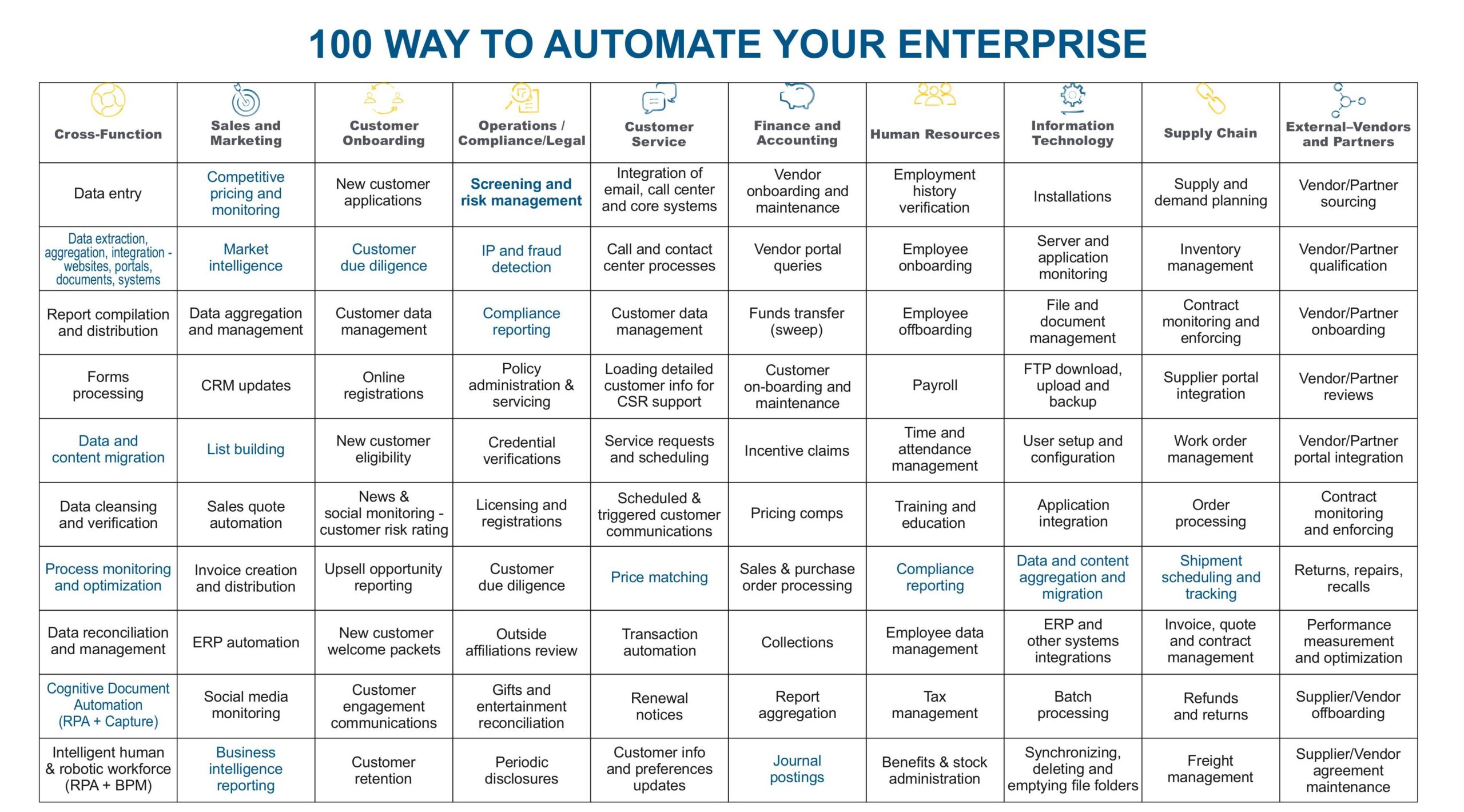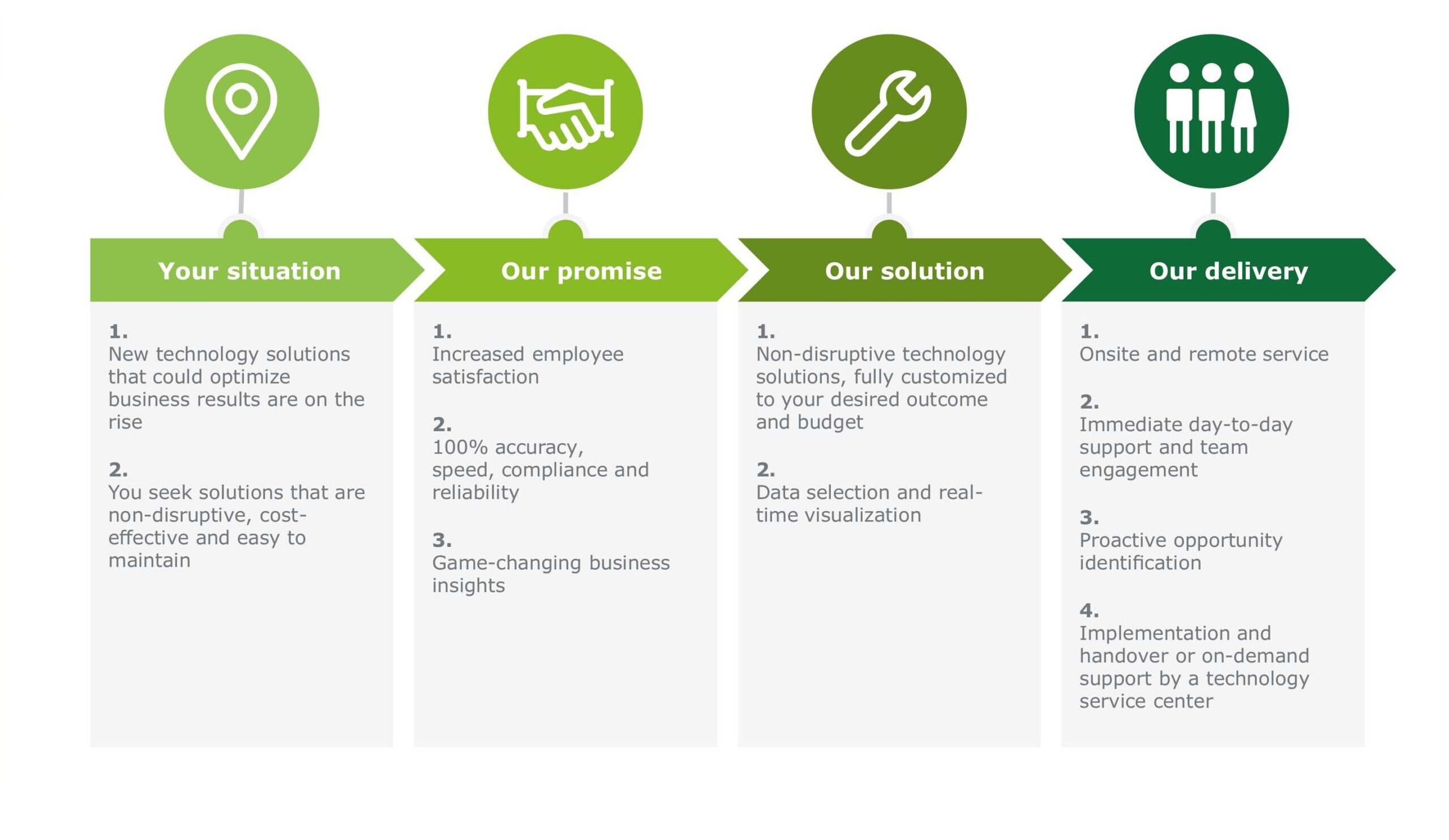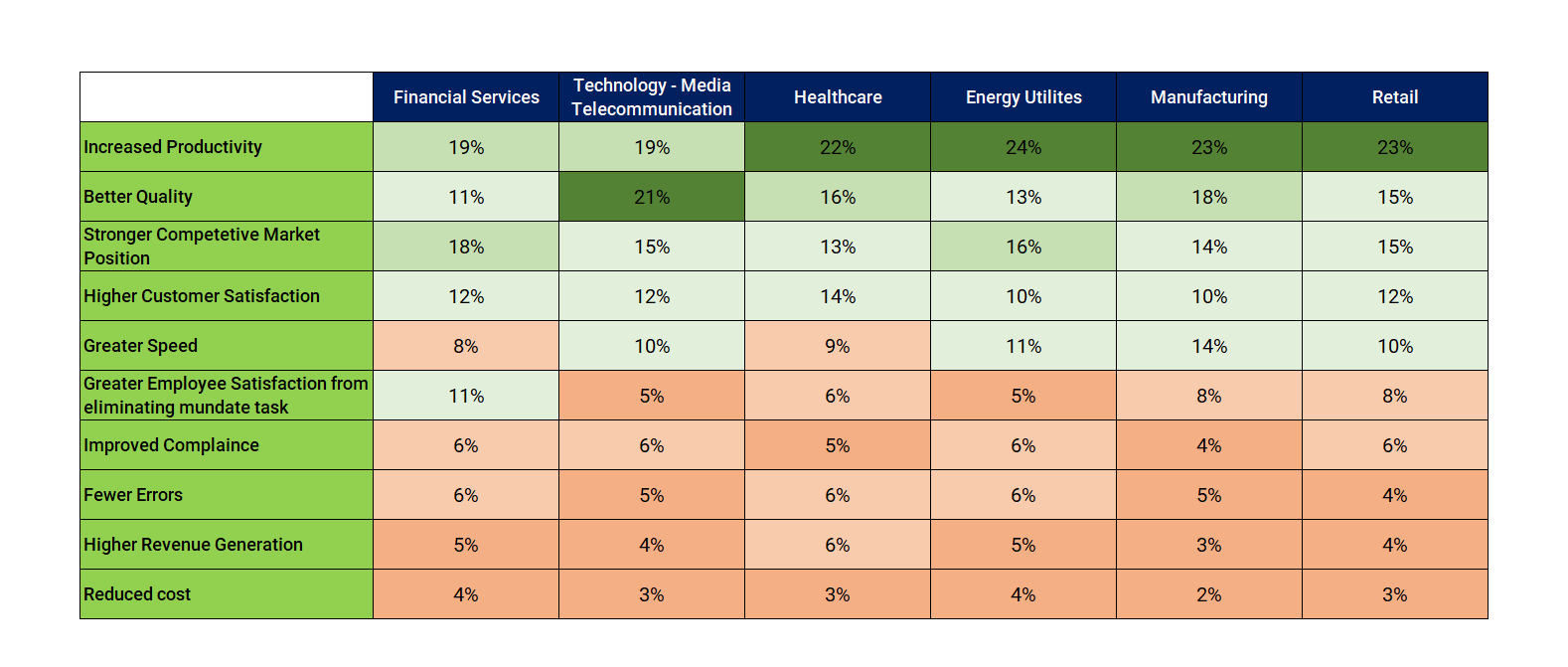Services
Our Enabling Services
DATA HARMONY
Data Harmony is to combine data from different sources and provides users with a comparable view of data from different departments/operations.
DATA INTEGERATION
The integrated data will be accessed by a front end tool which is user friendly. Created standard and useful reports with pre defined format
BUSINESS INTELLIGENCE
Data volume, velocity or variance along what complexity shouldn’t be a concern as our service helps to solve every road block with connected data
HYPER AUTOMATION (RPA)
RPA (Robotic Process Automation) bots are software robots that are often addressed as a digital workforce. It is pretty similar to human employee
Manufacturing
Robotic Process Automation (RPA) revolutionizes manufacturing by automating repetitive tasks, increasing efficiency, and reducing errors. RPA streamlines inventory management, accelerates production planning, and enhances quality control. It enables seamless integration between systems, facilitates data analysis, and empowers businesses to optimize operations, enhance productivity, and achieve greater agility in the manufacturing industry.
Retail & Trading
In the retail and trading industry, Robotic Process Automation (RPA) is a game-changer. It automates order processing, inventory management, and customer data analysis. RPA streamlines pricing updates, monitors competitor pricing, and enhances supply chain management. With RPA, retailers and traders can optimize operations, deliver personalized customer experiences, and gain a competitive edge in the market.
Healthcare
In the healthcare sector, Robotic Process Automation (RPA) revolutionizes operations. RPA automates tasks such as appointment scheduling, patient data entry, and claims processing. It improves accuracy, reduces administrative burdens, and enhances patient care. RPA enables healthcare providers to optimize workflows, increase efficiency, and focus on delivering high-quality, personalized medical services.
Banking
Robotic Process Automation (RPA) is reshaping the banking sector by automating routine tasks like data entry, customer onboarding, and compliance monitoring. RPA improves operational efficiency, reduces errors, and enhances customer experiences. It enables faster transaction processing, streamlines loan approvals, and strengthens fraud detection, empowering banks to provide seamless and secure financial services.
Supply chain management
Robotic Process Automation (RPA) transforms supply chain management by automating repetitive tasks such as order processing, inventory tracking, and shipment tracking. RPA streamlines data integration across systems, reduces errors, and enhances real-time visibility. It enables faster decision-making, improves demand forecasting, and ensures efficient inventory management, ultimately driving cost savings and operational excellence in the supply chain
Construction
In the retail and trading industry, Robotic Process Automation (RPA) is a game-changer. It automates order processing, inventory management, and customer data analysis. RPA streamlines pricing updates, monitors competitor pricing, and enhances supply chain management. With RPA, retailers and traders can optimize operations, deliver personalized customer experiences, and gain a competitive edge in the market.

Our Approach

Benefits at a Glance

Frequently Asked Questions
What is Robotic Process Automation (RPA)?
Robotic Process Automation (RPA) is a technology that uses software robots (bots) to automate repetitive tasks and workflows by interacting with applications and systems, just as a human user would. RPA can mimic human actions, such as clicking, typing, and data entry, to streamline business processes.
What are the benefits of implementing RPA?
Increased productivity and efficiency by automating repetitive tasks.
Improved accuracy and reduced errors compared to manual processes.
Cost savings by reducing the need for human labor in routine tasks.
Enhanced scalability as RPA bots can handle large volumes of work.
Faster processing times and shorter cycle times for tasks.
Improved compliance and audit trails through standardized processes.
Increased employee satisfaction by freeing them from mundane tasks.
What types of tasks can be automated with RPA
Data entry and data validation.
Report generation and data extraction.
Legacy system integration.
Invoice and purchase order processing.
HR onboarding and employee data management.
Customer service and support processes.
Financial and accounting tasks.
Web scraping and data aggregation.
Supply chain and logistics processes.
How does RPA integrate with existing systems and applications?
User interface (UI) automation: Bots mimic human actions by interacting with application interfaces, such as clicking buttons, typing data, and extracting information.
Application programming interfaces (APIs): Bots can utilize APIs to exchange data and perform actions with backend systems.
Screen scraping: Bots can extract information from legacy systems by scraping data from the screen.
Database connections: RPA bots can read from and write to databases directly.
File and folder interactions: Bots can work with files and folders, manipulating data and performing tasks based on predefined rules.
Is programming knowledge required to use RPA?
While programming knowledge can be beneficial, most RPA tools are designed to be user-friendly and do not require extensive coding skills. RPA platforms often provide visual design interfaces, drag-and-drop functionality, and pre-built automation components, allowing users to create automation workflows without writing code.
How secure is RPA?
RPA can be secure if implemented correctly. Security measures should include user authentication, role-based access controls, encryption of sensitive data, secure credential management, and adherence to industry-standard security practices. It’s essential to work closely with IT and security teams to ensure that RPA implementations meet the necessary security requirements.
How scalable is RPA?
RPA offers high scalability. Organizations can deploy multiple bots to handle large volumes of work simultaneously. RPA platforms typically provide centralized management and monitoring capabilities, allowing administrators to scale up or down the number of bots based on workload requirements.
Can RPA bots work 24/7?
Yes, RPA bots can work around the clock without needing breaks or vacations. Once deployed, bots can perform tasks continuously, leading to improved operational efficiency and faster processing times.

We specialize in providing customized Robotic Process Automation (RPA) services BRIM. Unlike off-the-shelf products, we believe in tailoring our solutions to address the unique challenges faced by our clients, whether they are small and medium-sized enterprises or Fortune 500 companies
Company
Data Harmony
Data Integeration
Business Intelligence
Hyper Automation
Registered Office:
#34 Rajaji Street, Veerapanchathram, Erode, Tamil Nadu – 638 004
Contact
+91 74182 55584
+91 74187 55584
Corporate Office:
92B Lakshmi flat, MGR road, State bank colony, 11th cross Street, Nanganallure,
Chennai – 600061
